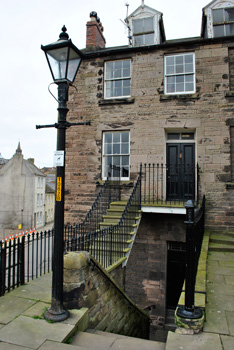
10 reasons why selling your house might not be tax free
In normal, day to day life, selling your home is usually tax free. So even if you make a massive profit when selling it most people don’t pay any tax. This is because it’s their main residence. It is fairly common to hear it said that you don’t pay tax on any profit when selling your home. But is this always the case? In my experience there are several situations which can lead to the possibility that tax will indeed be payable on selling a home. There are also various reliefs available which can reduce any tax due.
This is a very complex area of UK taxation (show me a simple one I hear you say!) and there are many traps for the unwary as well as opportunities for the well informed.
This article is aimed at expelling a few myths and perhaps enlightening a few people to tax saving opportunities which are out there.
1. Selling your house isn’t “exempt” from tax.
Instead there is a very complicated “relief” from tax as long as certain conditions are fulfilled. This is called “main residence relief” (for those interested it is called “relief on disposal of private residence” in the legislation – s222 Taxation of Chargeable Gains Act 1992). So essentially you have to work out the gain then see if the relief is available – if the conditions are met, and to what extent. Although this is a technicality it is important as it helps keep the possibility that some tax might be payable in your mind – it is not simply “exempt”
2. Is what you are selling a “dwelling-house”?
This might seem obvious but the number of cases which have gone to court is huge. Of course usually it is easy to tell. Your second floor flat, your bungalow, even your 5 bedroom house is clearly a “dwelling-house”. But what about a canal-boat? A caravan? Does it matter if it has wheels? Does it need to be connected to utilities? What if you live in a factory? There are cases which cover these situations. Generally speaking, if where you live is pretty much a fixed location (including caravans and boats) then it is likely that it constitutes a “dwelling” and can qualify for main residence relief.
3. How much land does your house have and what is it used for?
The basic rule is that up to 0.5 hectares of land qualifies for relief along with the house, as long as it is occupied as gardens or grounds. So if you have less than 0.5 hectares it should all qualify unless part of it is used for some other purpose, such as farming for instance. HMRC are also known to hold that if there is a wall or gate separating off the land from the house they will consider that as evidence that it is not “occupied as garden or grounds”. If the land is more than 0.5 hectares all might not be lost. If it can be argued that the larger area is necessary, “for the reasonable enjoyment of the dwelling house given the size and character of the house” a larger area might be included. In other words, if you are lucky enough to own a massive house then you can include a massive garden as it would look silly without it (think Buckingham Palace or similar with 0.5 acre garden!)
4. Why did you buy it?
There are a couple of hurdles to get over here. Firstly, I’ve come across several people over the years who have said that they bought a house, moved in, renovated it, then sold it and repeated the process several times. Sometimes they have even talked openly about how this was “tax free” earnings. Unless they were a client (I can’t actually think of one) I might give them a brief warning that this is not as simple as they think. Why is this? Well, the whole main residence relief depends on the “purpose” for buying it. If it was bought “wholly or partly” to make a profit the relief doesn’t apply and any gain is taxable. The full details of the provision is:
“Section 223 shall not apply in relation to a gain if the acquisition of, or of the interest in, the dwelling-house or the part of a dwelling-house was made wholly or partly for the purpose of realising a gain from the disposal of it, and shall not apply in relation to a gain so far as attributable to any expenditure which was incurred after the beginning of the period of ownership and was incurred wholly or partly for the purpose of realising a gain from the disposal.”
Quite a “catch-all” provision: strictly even if part of your reason for buying your home was to make a profit when selling it, then no relief is available. Perhaps the popularity of “How much my house has gone up in value” conversations over dinner would have been less if this was known, particularly if there was a tax inspector in the vicinity!
But seriously, this is not applied to the normal everyday hope that most people have to make some money when selling their house. But it does catch the people I mentioned above who move from house to house renovating and making a profit.
As if that wasn’t enough, I said above that there were two ways that the taxman can get you when selling your house in this type of situation. The second is for him to argue that you are “trading”. This doesn’t even need you to carry out any renovation work. Typically it would apply to someone who can recognise a bargain. They buy the house, move in, perhaps renovate a bit, then sell at a profit. If they do this often enough the taxman may argue that they are trading in houses. The profits will be subject to income tax and possibly National Insurance Contributions. Given that income tax rates can be as high as 45% compared with a maximum of 28% for capital gains tax (as in the first case above) this would have a devastating effect on how much you had left over from a sale. On top of that NIC can be 9% too so you could end up with less than half your profit.
How do you avoid this happening? Underlying this is your “intention” for the transaction – why are you buying the property. This is not a “subjective” test in that no one will try to look into your thoughts and see what your intention was. Rather a court would look at objective tests such as whether you advertised the property for sale as soon as you bought it; whether you registered to vote at the address and had your address changed on your driving licence; whether you changed your children’s school to one more local, etc. If you happen to be a house builder or property developer that will be considered relevant too! There are various indicators of your intention to live at an address for only a short period or a longer one. Which leads on to the next point…
5. Quality, not quantity
There is a myth I’ve heard that as long as you live at an address for at least six months then it will be exempt from tax as your main residence. I’m not sure where it started but it has been doing the rounds for many years. And it’s wrong. This is an area that HMRC have been focussing on in recent years. The rules say that the property must have been your “only or main residence” at some point during your ownership. It is the word “residence” that is important here. It doesn’t include temporary accommodation, brief stays etc but, the courts have decided, it does require some element of permanence. I touched on some of the aspects looked at above, (registering to vote at that address etc.) It’s the quality of your occupation that counts, not just the quantity.
6. You used the house partly for business purposes
This is an area where there is often a lot of misunderstanding. The rules are quite clear:
“If the gain accrues from the disposal of a dwelling-house or part of a dwelling-house part of which is used exclusively for the purpose of a trade or business, or of a profession or vocation, the gain shall be apportioned and section 223 shall apply in relation to the part of the gain apportioned to the part which is not exclusively used for those purposes.”
The important word here is “exclusively”. The rule is trying to catch situations which we commonly see with dentists and doctors. A substantial house has a part which is used as the surgery exclusively and there is another part of the building which is the doctor or dentist’s home. It is not aimed at the small business owner who works from the spare bedroom some of the time. I’ve seen it suggested that you have a private (non-business) party in the room involved and invite the local tax inspector so that he can see it’s not “exclusively” used for business. (A difficult thing to do these days as your “local” tax inspector is as likely to be in Milton Keynes as just down the road.)
Another way to support a claim that there was no “exclusive” business use is to restrict any claims for household expenses against your business profits to less than 100% of the amount allocated to that room (as it is used, say, 10% for private purposes.)
7. You rented out your property
If you have rented out your property during your period of ownership then some of the gain might be taxable. However there is a restricted relief which can be claimed. The restriction is that the relief relating to the period of rentals is the lower of:
a. The proportion of the gain (calculated on a monthly basis) relating to the period of letting
b. The proportion of the gain relating to the general main residence relief
c. £40,000
So if you owned a property for 10 years and made a £120,000 gain (ignoring annual allowances etc.) there will be £1000 gain per month. If the property was rented out for 4 years then the gain relating to the let period would be £48,000 (48 months at £1000). The proportion of the gain relating to main residence relief would be the balance of £72,000. So the rental relief would be £40,000 being the lower of the three amounts.
It is important to remember that this relief applies as long as the property was rented out at any time during the period of ownership, as long as the property has been your main residence at any time in that period. They don’t have to be concurrent.
8. You had two residences at the same time
You can only have one main residence at any time. So if you have two residences – i.e. places where you “live” – only one of them can be your main residence during that period. If no election is made then the taxman will decide based on the facts of the situation. Probably not ideal (although you can appeal!). You can make an election within two years of starting to have two residences and you can vary it in future. This is the “flipping” trick which certain MPs were “accused” of a couple of years ago. It might not be approved of by MPs but it is perfectly legal and provided for by the legislation! (but I suppose they had a hand in enacting it!)
If you have, or are intending to have two residences (or more) you need to take professional tax advice.
9. You were living somewhere else during the period you owned the property
It is quite common for people to have to move away temporarily from their main residence, often for work purposes. The law recognises this and allows certain periods of absence to be included in the relief.
To cover periods where it’s hard to sell the property, the last 18 months are always treated as a period of occupation even though you might have moved out. Up until 5 April 2014 this period was 36 months.
There are also allowances for periods where you have to move away for work and the property was your main residence before and after the period:
a. any period up to 3 years, plus
b. any period throughout which you were employed full-time abroad, plus
c. any period up to 4 years where your employer required you to work somewhere that meant it was unreasonable to live at home.
So overall you can see that there are several rules which can result in periods of non-residence to be counted as if you were living in the property.
10. You are married or in a civil partnership and you each have a house.
Whilst you are living together you can only have one “main residence” between you. So in a situation where two people get together and each owns a property which was up till then their main residence some care must be taken as to which property becomes the main residence, and how ownership is spread going forward. The tax consequences can be significant, especially if both properties are kept.
In conclusion, the above is a brief summary of the 10 main reasons why selling your house might not be tax free. In most cases none of this will apply, but it is relevant in many situations. As usual, this is not meant as a substitute for professional advice but as a pointer to issues which might be relevant for anyone selling their house. In my experience, most situations are not as bad as the owner expects it to be before discussing it with me. This is usually as they are not aware of the various reliefs mentioned above. The main issue, as always, is to get it right and at the same time minimising any tax due by claiming any reliefs available.
For a free, no-obligation meeting to discuss this or any tax or accounting issue call me, Ian McLeish, on 07900 824 143 ian@rosslynassociates.co.uk





